Ditapis dengan

Traditions in German-speaking mathematics education research
This open access book shares revealing insights into the development of mathematics education research in Germany from 1976 (ICME 3 in Karlsruhe) to 2016 (ICME 13 in Hamburg). How did mathematics education research evolve in the course of these four decades? Which ideas and people were most influential, and how did German research interact with the international community? These questions are a…
- Edisi
- -
- ISBN/ISSN
- 9783030110697
- Deskripsi Fisik
- viii, 278p. : ill.
- Judul Seri
- -
- No. Panggil
- 370 JAH t
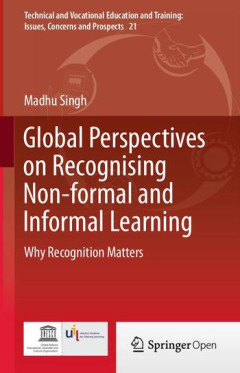
Global perspectives on recognising non-formal and informal learning :why reco…
This book deals with the relevance of recognition and validation of non-formal and informal learning education and training, the workplace and society. In an increasing number of countries, it is at the top of the policy and research agenda ranking among the possible ways to redress the glaring lack of relevant academic and vocational qualifications and to promote the development of competences…
- Edisi
- -
- ISBN/ISSN
- 9783319152783
- Deskripsi Fisik
- xix, 220p : ill.
- Judul Seri
- -
- No. Panggil
- 370.11 SIN g

Public-private dynamics in higher education:expectation, developments and out…
Worldwide, scholarship and policy-making develop new ideas and models for the role of higher education and research in society and economy. This development points to changing relationships and boundaries between the public and private spheres in higher education including their public and private steering and funding, public-private partnerships between universities and firms, the rise of priv…
- Edisi
- -
- ISBN/ISSN
- 9783899427523
- Deskripsi Fisik
- 525p.: ill.
- Judul Seri
- -
- No. Panggil
- 378.04 END p

Social and political dimension of mathematics education:current thinking
This book examines the current thinking on five critical social and political areas in mathematics education. It focuses on material conditions in teaching and learning, and details features of social life and their influence on mathematics teaching, learning and achievement. Following an introduction, the first section addresses equitable access and participation in quality mathematics educati…
- Edisi
- -
- ISBN/ISSN
- 9783319296555
- Deskripsi Fisik
- vii, 37p.:
- Judul Seri
- -
- No. Panggil
- 370

Professional learning in education
Educational quality is at the center of debates worldwide. In all these debates, teachers are considered as the critical actors determining to a large extent the quality of our educational systems. At the same time, doubts are expressed related to teachers’ quality as well as to the education or training of teachers. In this context, policy debates underline the need for ‘excellent’ teach…
- Edisi
- -
- ISBN/ISSN
- 9789038225968
- Deskripsi Fisik
- 229p. : ill.
- Judul Seri
- -
- No. Panggil
- 371.172 DE p

Buildings for education :a multidisciplinary overview of the design of school…
This open access book presents theoretical and practical research relating to the vast, publicly financed program for the construction of new schools and the reorganization of existing educational buildings in Italy. This transformative process aims to give old buildings a fresh identity, to ensure that facilities are compliant with the new educational and teaching models, and to improve both e…
- Edisi
- -
- ISBN/ISSN
- 9783030336875
- Deskripsi Fisik
- xvii, 326p. : ill.
- Judul Seri
- -
- No. Panggil
- 371.6 BUI b
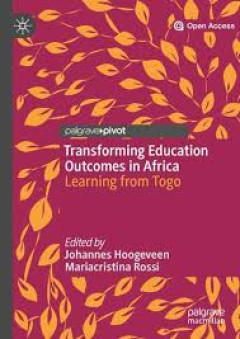
Transforming education outcomes in Africa:learning from togo
Every girl and every boy should have the right to a quality education so that they can have more chances in life, including employment opportunities, better health and also to participate in the political process. But education is not only a human right. Education reduces poverty, boosts economic growth, and increases income. It increases a person’s chancesof having a healthy life, reduces ma…
- Edisi
- -
- ISBN/ISSN
- 9783030127084
- Deskripsi Fisik
- -
- Judul Seri
- -
- No. Panggil
- 370.115 HOO t
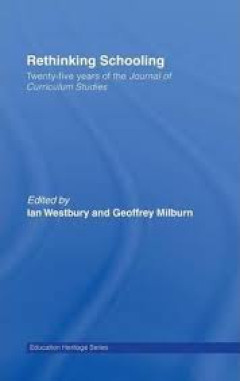
Rethinking schooling:twenty-five years of the journal of curriculum Studies
This book is the outcome of a challenge – an invitation to present a view of curriculum studies by way of a selection of articles drawn from the pages of theJournal of Curriculum Studies(JCS). JCShas been published since 1968. Since1987, the journal has appeared six times a year, with each annual volume containing more than 750 pages and about 40 articles. To keep this book to a reasonable si…
- Edisi
- -
- ISBN/ISSN
- 9780415407441
- Deskripsi Fisik
- -
- Judul Seri
- -
- No. Panggil
- 347 WES r
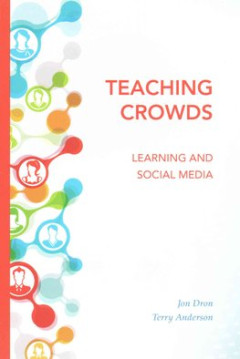
Teaching crowds :learning and social media
Within the rapidly expanding field of educational technology, learners and educators must confront a seemingly overwhelming selection of tools designed to deliver and facilitate both online and blended learning. Many of these tools assume that learning is configured and delivered in closed contexts, through learning management systems (LMS). However, while traditional "classroom" learning is by…
- Edisi
- -
- ISBN/ISSN
- 9781771990004
- Deskripsi Fisik
- xv, 353p. : ill.
- Judul Seri
- -
- No. Panggil
- 371.33 DRO t

Interpretive social research :an introduction
This volume is a clear introduction to methods of data collection and analysis in the social sciences, with a special focus on interpretive methods based on a logic of discovering hypotheses and grounded theories. The chief methods presented are participant observation, open interviews and biographical case reconstruction. The special advantages of interpretive methods, as against other qualita…
- Edisi
- -
- ISBN/ISSN
- 9783863953744
- Deskripsi Fisik
- 246p. : ill.
- Judul Seri
- -
- No. Panggil
- 301 ROS i

Battle for Open:How openness won and why it doesn't feel like victory
With the success of open access publishing, Massive open online courses (MOOCs) and open education practices, the open approach to education has moved from the periphery to the mainstream. This marks a moment of victory for the open education movement, but at the same time the real battle for the direction of openness begins. As with the green movement, openness now has a market value and is su…
- Edisi
- -
- ISBN/ISSN
- 9781909188365
- Deskripsi Fisik
- x, 232p. : ill.
- Judul Seri
- -
- No. Panggil
- 378.17344678 WEL b

The digital public domain :foundations for an open culture
Digital technology has made culture more accessible than ever before. Texts, audio, pictures and video can easily be produced, disseminated, used and remixed using devices that are increasingly user-friendly and affordable. However, along with this technological democratization comes a paradoxical flipside: the norms regulating culture's use —copyright and related rights —have become increa…
- Edisi
- -
- ISBN/ISSN
- 9781906924478
- Deskripsi Fisik
- xxv, 220p. : ill.
- Judul Seri
- -
- No. Panggil
- 346.048 DIG d

Knowledge manageation and big data :implications for sustainability, policy m…
The evolution of knowledge management theory and the special emphasis on human and social capital sets new challenges for knowledge-driven and technology-enabled innovation. Emerging technologies including big data and analytics have significant implications for sustainability, policy making, and competitiveness. This edited volume promotes scientific research into the potential contributions k…
- Edisi
- -
- ISBN/ISSN
- 9783039280094
- Deskripsi Fisik
- IX< 402 p.
- Judul Seri
- -
- No. Panggil
- 300.285 LYT k

Educational visions :lessons from 40 years of innovation
"Educational Visions looks to future developments in educational technology by reviewing its history, covering themes such as learning analytics and design, inquiry learning, citizen science, inclusion, and learning at scale. The book shows how successful innovations can be built over time, informs readers about current practice and demonstrates how they can use this work themselves. The ch…
- Edisi
- -
- ISBN/ISSN
- 9781911529811
- Deskripsi Fisik
- xvi, 168p. : ill.
- Judul Seri
- -
- No. Panggil
- 370 EDU e
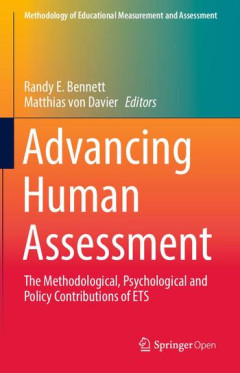
Advancing human assessment :the methodological, psychological and policy cont…
This book describes the extensive contributions made toward the advancement of human assessment by scientists from one of the world’s leading research institutions, Educational Testing Service. The book’s four major sections detail research and development in measurement and statistics, education policy analysis and evaluation, scientific psychology, and validity. Many of the developments p…
- Edisi
- -
- ISBN/ISSN
- 9783319586892
- Deskripsi Fisik
- xiv, 711p. : ill.
- Judul Seri
- -
- No. Panggil
- 371.26 ADV a
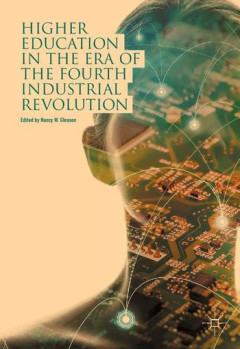
Higher education in the era of the fourth industrial revolution
This open access collection examines how higher education responds to the demands of the automation economy and the fourth industrial revolution. Considering significant trends in how people are learning, coupled with the ways in which different higher education institutions and education stakeholders are implementing adaptations, it looks at new programs and technological advances that are cha…
- Edisi
- -
- ISBN/ISSN
- 9789811301940
- Deskripsi Fisik
- xix, 229p. : ill.
- Judul Seri
- -
- No. Panggil
- 378 HIG h
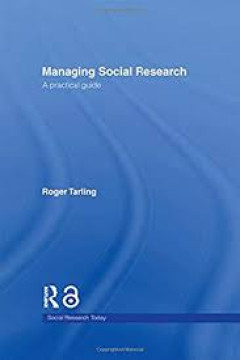
Managing social research:a practical guide
The recent Commission on the Social Sciences (2003) found it difficult, if not impossible to define social science other than in the broadest terms. 'In essence, then, we have come to see the social sciences as about "disciplined curiosity about societies in which we all live", leading to the creation and sharing of social knowledge.' The Commission felt the term social science was a misnomer …
- Edisi
- -
- ISBN/ISSN
- 9780415355162
- Deskripsi Fisik
- xi, 180 p. : ill. ; 24 cm.
- Judul Seri
- -
- No. Panggil
- 301.072 TAR m

Transforming research methods in the social sciences:case studies from South …
editors, Sumaya Laher, Angelo Fynn and Sherianne Kramer.
- Edisi
- -
- ISBN/ISSN
- 9781776143559
- Deskripsi Fisik
- xiv, 442 pages : illustrations ; 25 cm
- Judul Seri
- -
- No. Panggil
- 300.721 LAH t
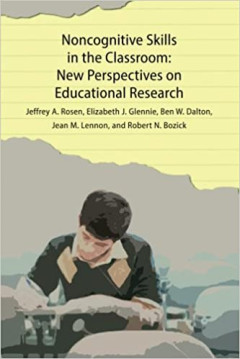
Noncognitive skills in the classroom :new perspectives on educational research
This book provides an overview of recent research on the relationship between noncognitive attributes (motivation, self efficacy, resilience) and academic outcomes (such as grades or test scores). It focuses primarily on how these sets of attributes are measured and how they relate to important academic outcomes. Noncognitive attributes are those academically and occupationally relevant skills …
- Edisi
- -
- ISBN/ISSN
- 9781934831021
- Deskripsi Fisik
- -
- Judul Seri
- -
- No. Panggil
- 370.72 ROS n
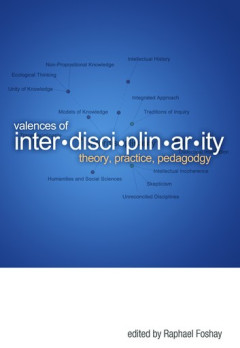
Valences of interdisciplinarity:theory, practice, pedagogy
The modern university can trace its roots to Kant's call for enlightened self-determination, with education aiming to produce an informed and responsible body of citizens. As the university evolved, specialized areas of investigation emerged, enabling ever more precise research and increasingly nuanced arguments. In recent decades, however, challenges to the hegemony of disciplines have arisen,…
- Edisi
- -
- ISBN/ISSN
- 9781926836485
- Deskripsi Fisik
- ix, 395p. : ill.
- Judul Seri
- -
- No. Panggil
- 378.199 VAL v
 Karya Umum
Karya Umum  Filsafat
Filsafat  Agama
Agama  Ilmu-ilmu Sosial
Ilmu-ilmu Sosial  Bahasa
Bahasa  Ilmu-ilmu Murni
Ilmu-ilmu Murni  Ilmu-ilmu Terapan
Ilmu-ilmu Terapan  Kesenian, Hiburan, dan Olahraga
Kesenian, Hiburan, dan Olahraga  Kesusastraan
Kesusastraan  Geografi dan Sejarah
Geografi dan Sejarah